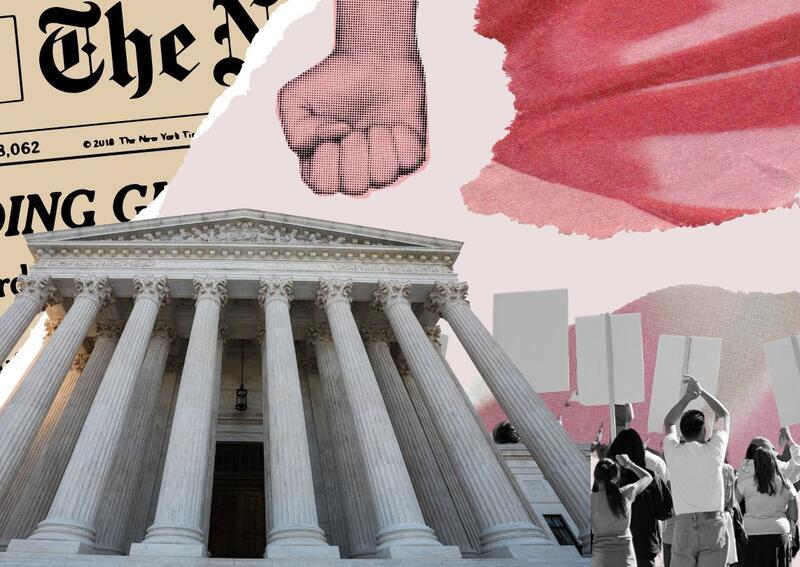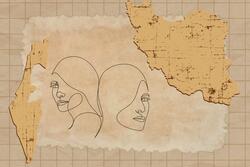Protesting for Abortion Rights as a Jewish Woman
On March 26th, 2024, I put on my favorite feminist T-shirt, created a protest sign, and went into DC with a frenzy of other feminists. The Supreme Court was hearing arguments about revoking FDA approval of the drug mifepristone. When taken with misoprostol, mifepristone is used to induce medicated abortions. There was palpable anxiety in the air over what the court would decide, especially after Roe v. Wade was overturned two years earlier.
Armed with my sign (it read Judges get out of my vagina or go to medical school), I stood outside the Supreme Court, demanding the human right to bodily autonomy that my mother had had nearly her entire life.
The rally was a sea of pink signs and rage. We were demanding, not asking, for safe, accessible medicated abortion to not be taken away from us. As I learned in my studies of Jewish history, freedom is something that cannot be taken for granted but must continuously be fought for.
There was fury and an underlying sense of grief over losing Roe, but more importantly, the rally gave a constructive space for those complex emotions about the loss of bodily autonomy. My fellow rally-goers gave me a sense of community. Whether it was shared chants or the “Girl, I love your hair” comments, I’ve never felt so safe or seen. It was freeing to be among people there who felt the same uncertainty and dread I did but were also committed to tikkun olam (the Jewish obligation to participate in social justice movements to create a better world).
I saw that protest is truly a communal act. Some older women were dismayed to see the same rights they fought for fifty years ago yanked away, younger people fighting for a right we had taken for granted, mothers who knew the impact that an intended pregnancy could have, and some male allies.
But I was still curious about the opposition to the protest. My other Jewish feminist friend and I moved towards the back of the group, where the few anti-choice protesters congregated. I saw a few with signs that read: “LGBTQ Jews Against Abortion” and noted that the people carrying them seemed to be male-presenting.
I walked up to the one who was yelling the loudest. “Excuse me, I’m Jewish as well and I was just curious where you got your beliefs from?”
“You wouldn't know the Talmud if it hit you on the ass!” he said, and then walked away, closing opportunities for further discussion.
I was confused. Our opinions, presumably, were formed by the same texts. How were our views so opposed? Also, weren’t Jews supposed to debate our interpretations and opinions, instead of leaving when our beliefs were questioned?
Was his misogyny a greater force than our shared Judaism? After all, some of the loudest pro-abortion voices have always been Jewish women. Jewish texts (like the Mishnah) have always been supportive of abortion to save the life of the mother. The National Council of Jewish Women's interpretation of Jewish law is that abortion is healthcare, that preexisting life trumps the rights of a fetus, that life does not begin at conception, and that abortion bans are contradictory and even discriminatory.
I must admit, the reason this man bewildered me is that my feminist education came from other Jewish women, primarily my mother. The most passionate women's liberation activists I know have been Jewish women. Working mothers and scholars are my rabbis. These women have been my examples, my role models, my North Star. So why was this guy showing up at a pro-abortion rally, advertising both his Jewish and his queer identities? I assumed that his carrying two disenfranchised identities would make him an ally for other marginalized groups.
I realized, then, that I did not need to fight him, but the system that created the beliefs he was espousing. It wasn’t my business to try to understand or tell men, even Jewish men, why I deserved rights. It was my job to articulate and demand my rights like I did at the abortion rally.
In a unanimous ruling, the court preserved the right to mifepristone, allowing it to be sold online. I was so relieved that I cried when I read the headline. I realized it is a Jewish practice to advocate for social justice. Standing in that crowd of like-minded people, all connected and fighting for the same things, felt as spiritual as a shul. But abortion access is still precarious. Thirteen states currently outlaw abortion entirely, and many more place heavy restrictions on it. In the thrall of the crowd, I learned that the only way to force lawmakers to take their laws off my (and other’s) body is to fight. Even if I didn't agree with the LGBTQ Jews Against Abortion counter-protesters, we both engaged in a fundamentally Jewish act: protest.
This piece was written as part of JWA’s Rising Voices Fellowship.







